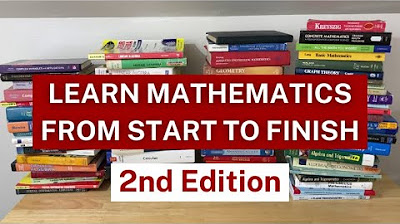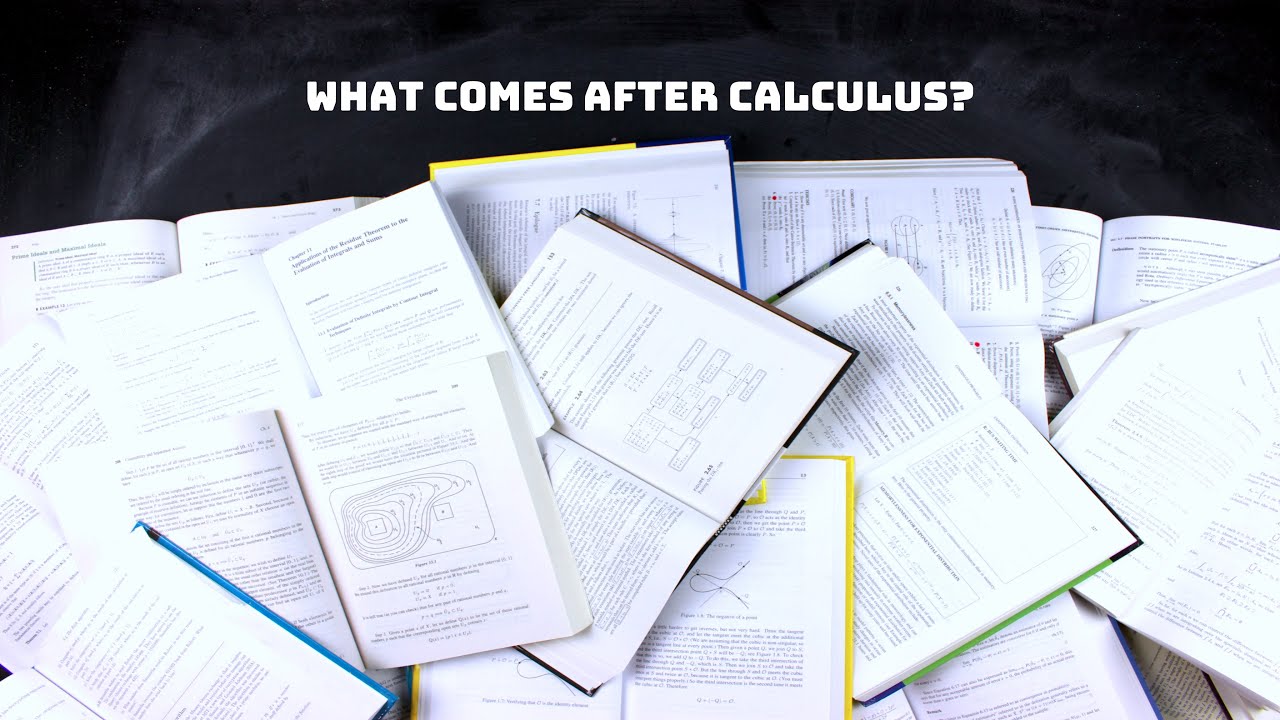Epic Math Book Speed Run
TLDRIn this video script, the speaker shares their passion for mathematics by conducting a 'speed run' of their personal math book collection. They provide a detailed overview of various books spanning topics like real analysis, topology, abstract algebra, and more, offering insights into their utility for beginners and advanced students. The script serves as a comprehensive guide for those interested in mathematics, highlighting the diversity of resources available for learning different mathematical disciplines.
Takeaways
- 🎮 The speaker initially thought of creating a YouTube channel for speed runs of old Nintendo games but instead has a math channel.
- 📚 The video features a 'speed run' through a collection of math books, with brief discussions on each one.
- 🔗 Links to the books are promised in the video description for those interested in further exploration.
- 📘 Several of the books are old and might not be available, but many are still in print and can be accessed.
- 📑 The first book mentioned is a graduate-level text on real analysis by Bruckner and Thompson, recommended for beginners in measure theory.
- 📖 The speaker has read and recommends several books for their clarity and utility in learning various math topics, such as topology and real analysis.
- 📝 Counterexamples in topology and analysis are highlighted as important for understanding the non-intuitive aspects of these fields.
- 🤓 The speaker's favorite books for proof writing include 'Introduction to Abstract Mathematics' by Bonding Keen and 'Analysis I' by Serge Lang.
- 📐 A book by Ronald Gould on graph theory is recommended for those interested in learning about the subject.
- 📈 The video also covers books on differential geometry, complex variables, and a unique approach to teaching calculus with 'Calculus Made Easy' by Thompson.
- 📚 The importance of having multiple books on a subject is emphasized, as different perspectives can aid understanding.
Q & A
What is the main theme of the video?
-The main theme of the video is a speed run through the presenter's collection of math books, providing brief overviews and personal insights into each book.
Why might someone be interested in the books mentioned in the video?
-Someone might be interested in these books if they are studying mathematics, looking for beginner-friendly materials, or seeking specific topics within math such as topology, real analysis, or abstract algebra.
What does the presenter think about the book 'Real Analysis' by Bruckner and Thompson?
-The presenter believes it is a very beginner-friendly book on measure theory and real analysis, suitable for first-year graduate students in mathematics.
Which book did the presenter use for their undergraduate studies in topology?
-The presenter used a book that first introduces topologies in terms of neighborhood systems, which they found challenging at first but ultimately very informative.
What is unique about the book 'Counterexamples in Topology' by Steen and Seebach?
-The book is unique because it is filled with strange and counter-intuitive examples in topology, which are important for understanding the field.
Why would 'Introduction to Abstract Mathematics' by Bonding Keen be recommended for someone learning to write proofs?
-It is recommended because the presenter found it to have a good writing style, clear explanations, and a variety of exercises, making it one of the best books for learning to write proofs.
What is special about the book 'Elementary Real and Complex Analysis' by George Shillov?
-The book is special because it covers both elementary and real complex analysis, providing a comprehensive introduction to the subject at an affordable price as a Dover book.
What does the presenter like about 'Graph Theory' by Ronald Gould?
-The presenter likes that the entire book is devoted to graph theory, starting with the basics and progressing further, making it a nice introductory book on the subject.
Outlines
🎮 Gaming to Math Books Speed Run
The speaker, a self-proclaimed 'huge gamer' with a lifelong passion for video games, humorously transitions from discussing speed runs of old Nintendo games to a 'speed run' of their math books. They plan to briefly discuss each book in their collection, ranging from real analysis to topology, and encourage viewers interested in the books to check the description for links. The collection is vast, with some books being very old, potentially out of print, but many still available. The first book mentioned is a graduate-level real analysis text by Bruckner, Bruckner, and Thompson, which the speaker found beginner-friendly, contrasting it with other popular real analysis books by Rudin, Wrighton, and Folland.
📚 Diverse Math Books for Different Disciplines
This paragraph delves into a variety of math books covering several disciplines. The speaker discusses books on topology, including one used during their undergraduate studies and another filled with counter-intuitive examples. They mention a book on advanced calculus with unusual examples, a favorite book on proof writing, and an old topology book signed by a previous owner. The speaker also covers books on real and complex analysis, graph theory, differential geometry, and algebra, highlighting their unique features, such as affordability, specialized examples, and accessibility.
Mindmap
Keywords
💡Speed run
💡YouTube channel
💡Measure theory
💡Real analysis
💡Topology
💡Counterexamples
💡Proof writing
Highlights
The speaker shares their passion for video games and mathematics, expressing a desire to create a YouTube channel for speed runs of math books.
Introduction to a real analysis book by Bruckner and Thompson, recommended for beginners in measure theory.
Discussion of alternative real analysis books by Rudin, Wrighton, and Folland, and how they compare to Bruckner and Thompson.
A worn-out topology book used by the speaker as an undergraduate, highlighting its importance and the difficulty of understanding neighborhood systems.
Recommendation of 'Counterexamples in Topology' by Steen and Seebach for understanding counter-intuitive examples in the field.
Praise for 'Counterexamples and Analysis' as a valuable resource for undergraduates studying real analysis.
Introduction to 'Introduction to Abstract Mathematics' by Bonar and Keen, lauded for its approach to proof writing.
A vintage topology book by Mendelssohn, appreciated for its coverage of core topics and conciseness.
Review of 'Elementary Real and Complex Analysis' by Shillov, noted for its affordability and comprehensive content.
Discussion of 'Graph Theory' by Ronald Gould as an introductory book dedicated solely to graph theory.
Highlighting a differential geometry book by William C. Graustein, suitable for those with a strong calculus background.
Serge Lang's 'Analysis I' is recommended for its high-quality writing and comprehensive coverage of analysis topics.
Introduction of 'Galois Theory' by Emil Artin, a small but impactful book on the subject, written by a renowned mathematician.
Review of 'Modern Algebra: An Introduction' by Durbin, noted for its unique layout and specialized topics like symmetry and crystallographic groups.
Discussion of Terence Tao's 'Analysis II', appreciated for its unique writing style and popularity upon release.
Recommendation of 'The Language of Mathematics' by Frank Land for those seeking a different perspective on basic mathematics.
Introduction to 'Number Theory' by George Andrews, an affordable Dover book aimed at introducing readers to the theory of numbers.
Review of 'Complex Variables: Introduction and Applications' by Ablowitz and Fokas, a comprehensive book used for a graduate-level course.
Serge Lang's 'A First Course in Calculus' is praised for its beginner-friendly approach and smooth writing style.
Highlighting a unique topology book with full solutions to exercises, a rarity in the field.
Discussion of 'Real and Functional Analysis', a book focusing on functional analysis with standard topics.
Introduction of 'Linear Algebra: Challenging Problems for Students' by Zang, a problem book with solutions for linear algebra.
Review of 'Applied Combinatorics' by Alan Tucker, a comprehensive book on combinatorics with solutions to some problems.
Recommendation of 'How to Prove It: A Structured Approach' by Velleman for learning the process of writing proofs.
Introduction to 'Sets with Applications' by Zenna, a beginner-level book covering topics like set algebra and probability theory.
Review of 'Real Analysis' by Nicholas K. Artemiades, a lesser-known but comprehensive book on the subject.
Discussion of 'A First Course in Probability' by Sheldon Ross, noted for its rigorous treatment and intertwining with calculus.
Highlighting 'Differential Equations in Engineering Problems' by Miller, a well-written book once owned by the US Army.
Introduction to 'Applied Complex Variables' by Detman, a book that sparked the speaker's interest in math.
Review of 'Introductory Discrete Mathematics' by Balakrishnan, a concise and affordable Dover book.
Discussion of 'Linear Algebra' by Friedberg, Insel, and Spence, a comprehensive and rigorous book recommended for every linear algebra student.
Highlighting 'Exercises in Algebra' by Robbins and Somerville, a 1904 book providing basic algebra exercises.
Introduction to 'Discrete Mathematics' by Shams, an outline series book with plenty of work problems.
Review of 'Trigonometry' by Rice and Strang, a good book for those studying or struggling with trigonometry.
Discussion of 'Concepts and Abstract Algebra' by Lansky, a detailed book covering set theory and algebraic topology.
Highlighting 'Algebraic Topology' by Wyburn, an old book providing a good introduction to the subject.
Introduction to 'Theory of Sets' by Joseph Brewer, a book covering various aspects of set theory.
Review of 'Number Theory' by Long, an old book with an elegant writing style and a focus on problem-solving.
Highlighting a disappointing experience with a used copy of 'Linear Algebra' by Larry Smith, falling apart due to age.
Introduction to 'Calculus of Several Variables' by Atanasov, a modern treatment of multi-variable calculus suitable as a supplement.
Review of H.B. Phillips' 'Differential Equations', a book with solutions to all problems, a rare feature.
Discussion of 'Differential and Integral Calculus' by H.B. Phillips, a historical book with answers to all exercises.
Highlighting 'Elements of Complex Analysis' by Shanin and Gutenmacher, a unique approach to complex analysis.
Transcripts
Browse More Related Video
5.0 / 5 (0 votes)
Thanks for rating:





